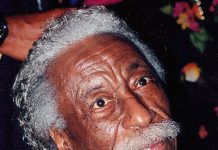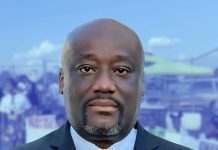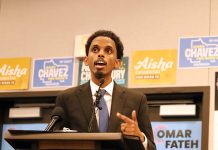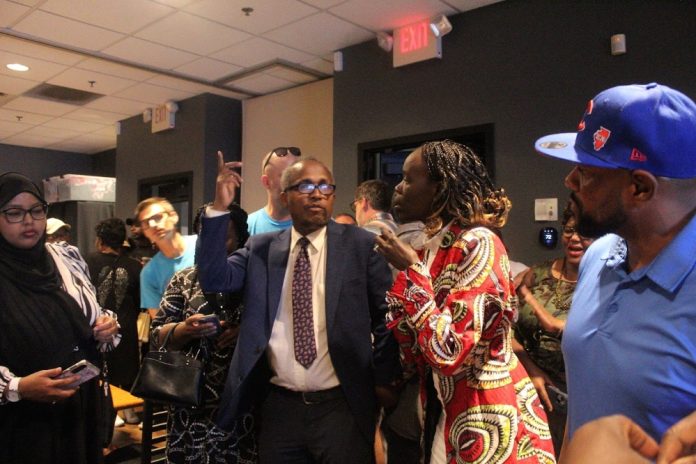
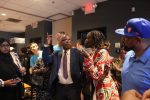
The 2024 Minnesota primary elections brought significant attention to the City Council races in Brooklyn Park’s Central Ward and Brooklyn Center. The outcomes of these races are set to shape the future of these key Twin Cities suburbs, as they continue to navigate issues of public safety, affordable housing, and economic development.
Brooklyn Park Central Ward: Wako and Page lead the pack
In the highly competitive Brooklyn Park Ward Central District race, Teshite Wako emerged as the frontrunner, securing 33.14% of the vote. Wako’s strong showing positions him as a key contender in the upcoming general election, where he will face off against his closest competitor, Shelle Page, who garnered 23.39% of the vote.
Wako, who has been actively involved in community organizing and advocacy, focused his campaign on issues such as affordable housing, public safety, and increasing opportunities for marginalized communities. His message clearly resonated with a significant portion of the electorate, particularly in areas with large immigrant populations.
Page, a community leader with a background in social services, campaigned on a platform centered around attracting and retaining residents, supporting local businesses, and representing the city’s diverse population. She expressed gratitude toward her neighbors who supported her.
“We look forward to the opportunity to work hard for our district, and residents, and also look forward to serving our city,” Page said.
Steve Antolak, a long-time resident and former council member, came in third with 20.28% of the vote. Although he will not advance to the general election, his campaign highlighted concerns about fiscal responsibility and preserving the city’s character amid rapid growth.
The remaining candidates, Wole Osibodu, Ugo Ugonwayi and Martino Nguyen, trailed behind, with each receiving less than 10% of the vote. Their campaigns focused on niche issues such as environmental sustainability and youth mental health. Though his results may be discouraging, Osibodu said it does not spell the end of his political journey.
“I wish my fellow candidates well as they continue on to the general elections in November,” Osibodu said. “As for me, I will continue on this journey that I believe is a calling, and will continue to be active in my community and in my city.”
“While I didn’t secure victory at the polls, this experience is a personal win,” Nguyen said. The Vietnamese community in Brooklyn Park is now more engaged in local politics than ever before.
Brooklyn Center: Lawrence-Anderson and Enger advance in a tight race
Over in Brooklyn Center, the City Council race proved to be equally competitive, with Kris Lawrence-Anderson leading the pack with 24.85% of the vote. Lawrence-Anderson, a seasoned council member with a reputation for pragmatic decision-making and strong constituent services, has built a broad coalition of supporters across the city. Her platform emphasized continuing the city’s work on police reform, enhancing community services, and fostering economic growth, particularly in underserved areas.
Trailing closely behind Lawrence-Anderson was Gretchen Enger, who secured 21.90% of the vote. Enger, a newcomer to city politics but a long-time community activist, has been a vocal advocate for affordable housing and social justice issues. Her campaign gained significant momentum in the final weeks leading up to the primary, particularly among younger voters and those seeking more progressive change in the city’s policies.
Expressing her excitement, Enger revealed what she’s been working on in her mission for a better Brooklyn Center.
“I’ve been actively engaging with local businesses as the first step toward creating an environment that attracts new ventures and drives economic prosperity in Brooklyn Center.”
Laurie Ann Moore, who finished third with 17.14% of the vote, is also a community advocate with a focus on education and youth services. Despite not advancing to the general election, Moore’s campaign brought important issues to the forefront, particularly regarding the need for more resources and support for local schools.
The other candidates in the race, including Jamal A. Said, Andrew Johnson, and Joshua Jenson, received less than 15% of the vote each. Despite the loss, Nguyen celebrated his campaign and the positive interactions he saw in his community.
Looking ahead to November
With the primary results now in, the focus shifts to the general election in November, where the top two candidates in each race will go head-to-head. In Brooklyn Park, Wako and Page will vie for the Ward C seat, while in Brooklyn Center, Lawrence-Anderson and Enger will face off in what promises to be a closely watched contest.
As the candidates prepare for the next phase of the campaign, voters in both cities can expect robust debates on key issues. The outcomes of these races could shape the future direction of Brooklyn Park and Brooklyn Center.
About Panashe Matemba-Mutasa, Mshale Reporter
Panashe is a general assignments reporter. She is a graduate of the University of Minnesota and a UC Berkeley Graduate School of Journalism Class of 2025.


